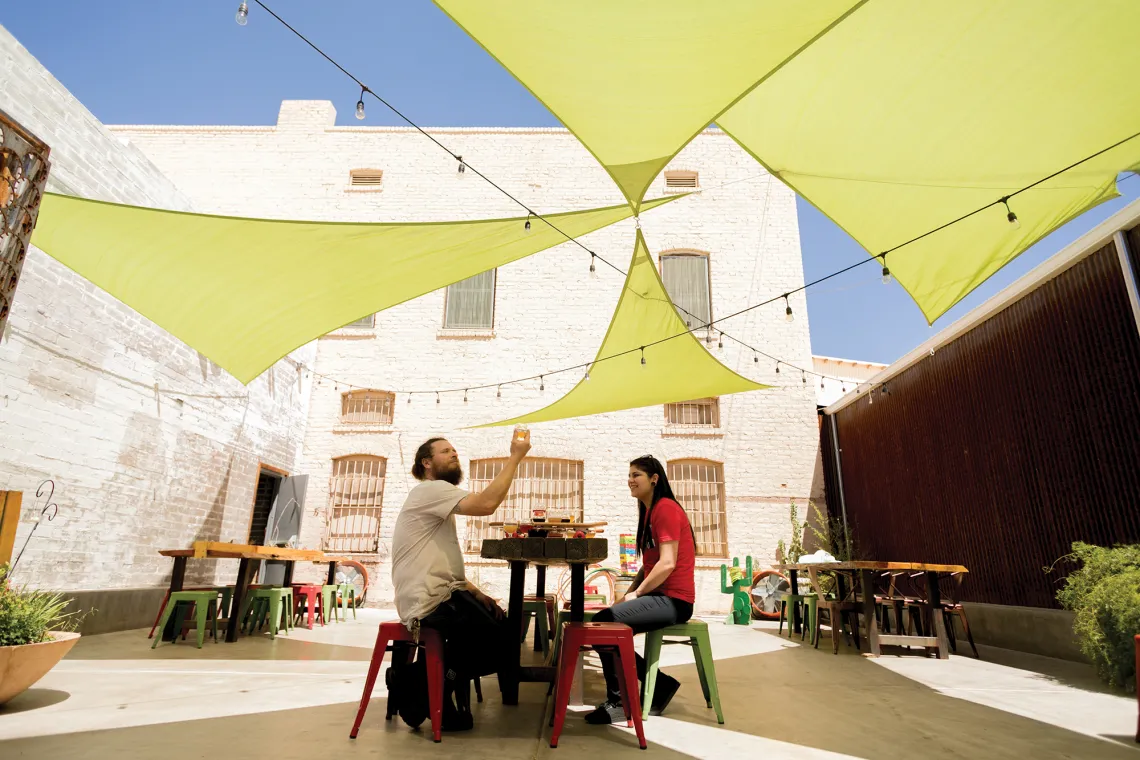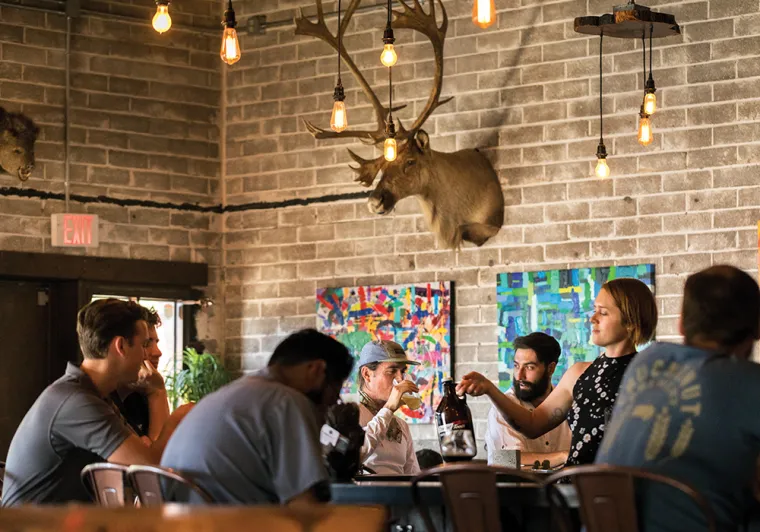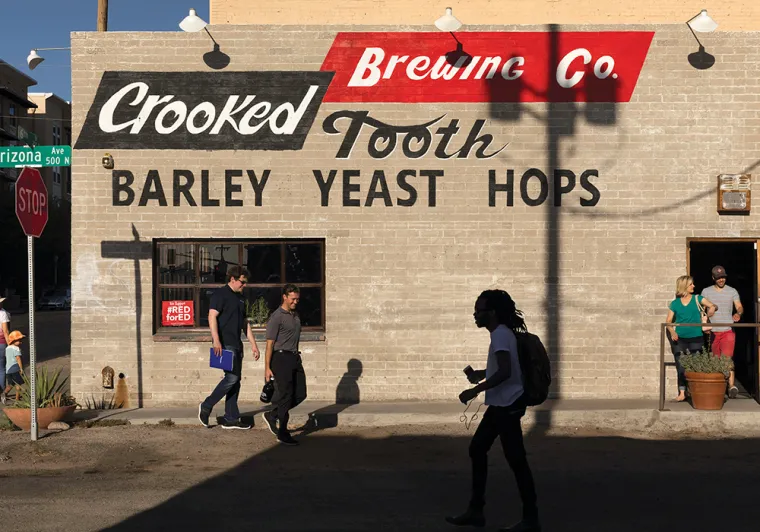Brainy Brews
Combining chemistry and creativity in craft brewery

Crooked Tooth’s Ben Vernon, left, takes a break from brewing to review a flight of their signature sour beers, served on a skateboard, with a new bartender in the brewery’s beer garden.
Sometimes in this world, the chemistry is just right. Consider the Crooked Tooth Brewing Co., headquartered in downtown Tucson. Ben Vernon ’10, who started the brewery with his wife, Julie, is a UA environmental science grad, so the man knows his way around a periodic table. And then aiming all that brainpower toward making fine beer? Well, that could be considered a service to humanity.
Vernon was in soil and water sciences, a specialty that’s particularly useful when wrestling with Tucson’s hard tap water. “Knowing the mineralization of water and water chemistry is important — knowing pH control and how to bring it down, for example, if I use phosphoric acid versus citric acid, and other elements in the brewing the process,” Vernon says.
Without getting into the technical weeds, suffice to say these are very heady brews. “There is a lot of microbiology and chemistry tangled up in beer making,” Vernon says. “I’ve noticed that a lot of brewers tend to have a background like mine. One friend I met in the brewing community has a degree in microbiology and another in biology.”
Pointing to the popularity of brewing, some universities now offer degrees in fermentation.
“I think people with that degree will even have one up on those of us with science backgrounds,” he says.
Of course, Vernon had a little fermentation training himself, beginning when his wife gave him a home-brewing kit a dozen years ago. “She knew what she was doing when she bought it,” he laughs. “I instantly dove right in. The next thing you know, I had an all-grain system, and four dedicated refrigerators and five beers on tap in my house. My dad was talking to my daughter once, and he told her, ‘Hey, go home and take a bath.’ She said she couldn’t because her dad’s beer was fermenting in the bathtub.”
After college, he spent a few years working for a hydrogeological company. But what was supposed to be less than half the year spent traveling quickly doubled, and soon he was rarely seeing his kids. So he and Julie (she’s a former Wildcat herself, by the way, as is his father and a great-aunt) were sitting in a coffee shop kicking around ideas when the notion of a brewery popped up. “It was inevitable,” Vernon says, “that my brewing obsession would eventually take over.”

Crooked Tooth’s taproom has a quirky industrial vibe that pays homage to the history of the space as a garage, now spiced up with taxidermied animal heads, local art, a pinball machine and hula hoops.

Crooked Tooth’s taproom has a quirky industrial vibe that pays homage to the history of the space as a garage, now spiced up with taxidermied animal heads, local art, a pinball machine and hula hoops.
They opened the brewery on Nov. 4, 2016, with an unusual mission statement: “Our mantra is like a crooked tooth, a mole, a lazy eye,” reads their Facebook page, “as in ‘be yourself and relish what makes you different. Don’t alter who you are to conform to societal standards but stand out.’ We apply this in life and in brewing.”
And with that, they were off. The brewpub itself is charming and homey, with a 1,400-square-foot beer garden and big community tables. Mainstay brews range from Archmagus Ale, with caramel and roasted nut, to Lazer Soundwaves — a sour, peppery saison — and Crooked Light, a crisp, American-style ale with hints of straw.
Vernon’s exhaustive understanding of brewing chemistry shines through in each of these beers, as does his penchant for locally sourced produce, from kumquats and peaches to grapefruit. “I’m after weird ingredients,” he says. “I like it whenever you’re pushing those boundaries of what people think is OK or not OK for beer. For instance, we just made a strawberry-basil sour saison. I put in 300 pounds of strawberries and four pounds of basil. It’s fantastic. We took it to the Baja Beer Festival, and we got great feedback. Our sales rep went out on his first day and sold eight kegs of it.”
Julie Vernon gets in on the action, too, he says. “Every full moon, some women at work here, and even women from other breweries, do a special full-moon beer. The one coming out soon will be a German sour beer. The beer is salty, so we added some turmeric, and we’re getting ready to add some kumquats tomorrow.”
While there’s plenty of higher thinking involved, coming up with these clever beverages is not exactly rocket science. “Mostly, it’s just us sitting down over a beer and thinking about what fruits are going to be available, what flavors are going to be available, what ingredients can we grab,” he says.
Of course, even the most innovative brewery must be cognizant of an ever-shifting craft beer industry. According to the Brewers Association, a national group of commercial and home beer- makers, growth among regional brewers — those producing more than 15,000 barrels a year — has largely flatlined. But market share for smaller breweries such as Crooked Tooth has continued to grow. However, the explosive growth of small breweries has slowed a bit in recent years. In 2017, for instance, small brewers produced an average of 200 more barrels than the year before, compared with 900 more barrels in 2014. On the bright side: Even those sobering numbers haven’t dampened enthusiasm for this specialty industry; nearly 1,000 new breweries opened in 2017, and thousands more are planned.
None of these trends surprise Vernon. “Microbreweries have been taking on the large brewers for 20 years,” he says, “so it’s bound to plateau, and then stay linear. I just think we may be getting to the saturation level.”
Perhaps. But you won’t find many plateaus at Crooked Tooth. “We have nine taps and we try to keep them all full,” he says. “Now, in our second season, we’re also getting ready for an in-house expansion — we’re getting another fermenter and a bunch of barrels.”
As for all those other breweries sprouting up out there, “Of course it’s competitive,” he says. “But it’s a very respectable competition. All of us have our own niches — and there are lots of niches in Tucson.”
Label this the smartest niche of all.
